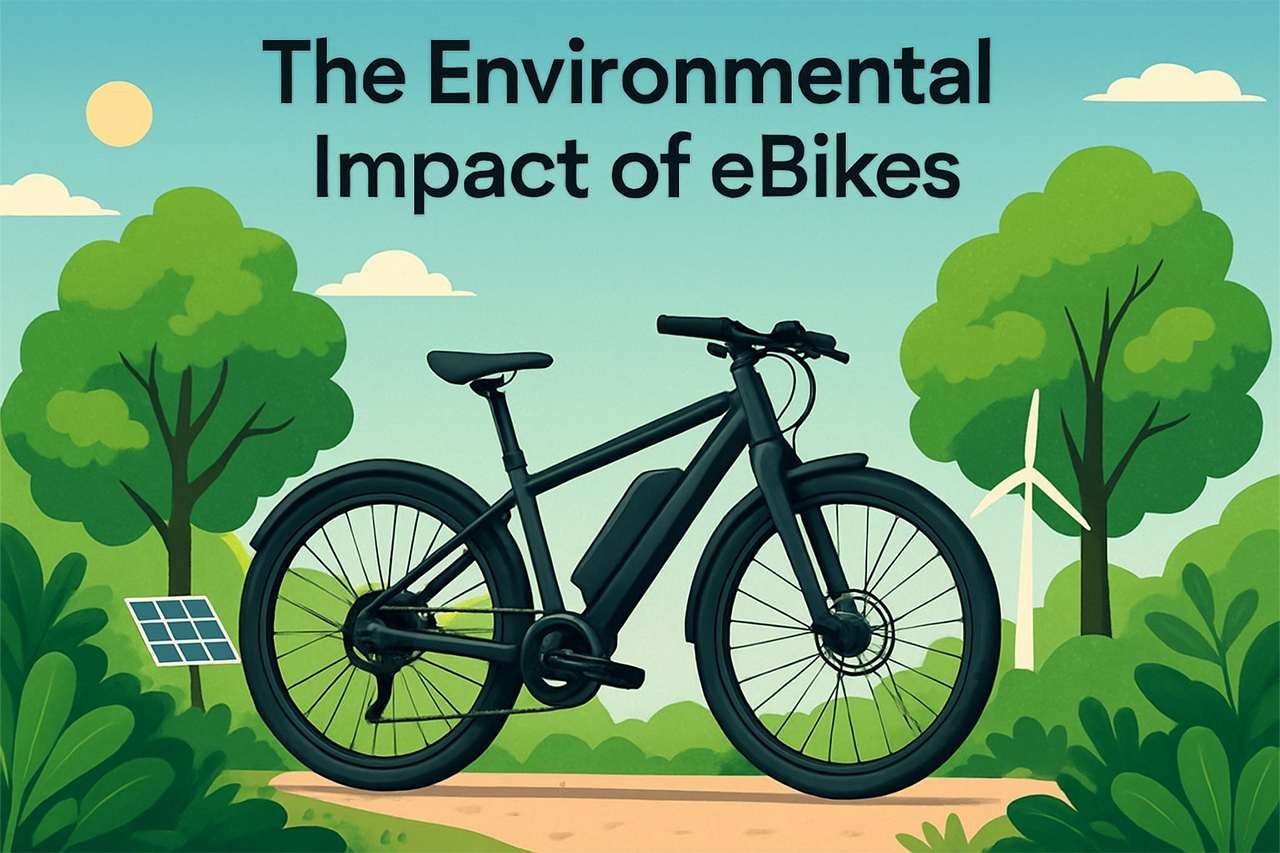
Electric bikes are everywhere these days. People want cleaner ways to get around, but do these battery-powered bikes really help the environment, or are we just trading one problem for another?
eBikes crank out a fraction of the carbon emissions cars do—just 21-25 grams of CO2 per kilometer, compared to a whopping 220 grams for your average car. The environmental impact of bikes and e-bikes is clear: making an e-bike creates about 134-165kg of carbon emissions, while even a small car clocks in at 5.5 tons just to roll off the assembly line.
Let’s dig into how e-bikes compare to cars and regular bikes, check out their energy chops, and take a closer look at those infamous batteries. If you’re curious about whether these zippy rides are really planet-savers, stick around.
How eBikes Reduce Their Environmental Impact
eBikes cut carbon emissions by taking cars off the road and using way fewer resources. They don’t spew anything out the tailpipe, so cities get a breath of fresh air—literally.
Reducing Greenhouse Gas Emissions
eBikes make a dent in carbon footprints. Building one produces just 134-165kg of CO2 equivalent, while a small car needs 5.5 tons and SUVs can go up to 13 tons. That’s a huge gap.
But the real magic happens when you actually ride. eBikes emit only 21-25g of CO2 per kilometer. Compare that to 220g for a typical car and even electric cars at 160g/km, and it’s not even close.
Daily Impact Comparison:
- E-bike: 21-25g CO2/km
- Electric car: 160g CO2/km
- Gas car: 220g CO2/km
Switching from car to e-bike saves 249g of CO2 for every kilometer. If you ride 10km to work and back, that’s about 2.5kg of carbon you’re not dumping into the atmosphere every day.
Conserving Natural Resources
eBikes barely sip raw materials compared to cars. They’re light, so you need less steel, aluminum, and plastic. The battery is the biggest chunk, but modern lithium-ion packs can last 3-5 years if you treat them right.
eBike factories also use less energy and water than car plants. Smaller supply chains mean fewer emissions from moving parts around. It’s not perfect, but it’s a step in the right direction.
Battery recycling is getting better too. Companies now take old batteries back and recover lithium, cobalt, and nickel. It’s not a closed loop yet, but it’s moving that way.
Improving Urban Air Quality
Zero tailpipe emissions? That’s a game-changer for city air. eBikes don’t pump out nitrogen oxides, particulate matter, or carbon monoxide. That means cleaner air where we all live and work.
Some cities are already seeing the difference. If e-bikes replaced car travel in England, they could cut CO2 emissions by 50 percent—almost 30 million tons a year. Wild, right?
As more people hop on eBikes for short trips (and 40% of car trips are under 2 miles!), the city gets less smog, fewer health issues, and cooler streets. It’s not a silver bullet, but it helps.
Energy Efficiency and Renewable Power
eBikes use way less energy than cars and can easily run on clean power. Their motors are super efficient, and if you charge up with solar or wind, the impact drops even more.
Comparing Energy Consumption
On energy, eBikes are almost laughably efficient. You’ll use about 0.1 to 0.2 kWh for every 20 miles you ride.
Electric cars? They need 6-8 kWh to cover the same ground. That’s 30-40 times more energy just to get you to work.
Check out this breakdown:
| Transportation Method | Energy per 20 Miles | CO2 Emissions |
|---|---|---|
| E-bike | 0.1-0.2 kWh | 0.05-0.1 lbs |
| Electric car | 6-8 kWh | 3-4 lbs |
| Gas car | 1-2 gallons | 20-40 lbs |
If you pedal along with the motor, you can slash your energy use by another 20-30%. Throttle-only riding is fun, but you’ll pay for it at the plug.
Supporting Renewable Energy
eBikes and solar panels? Match made in heaven. Their batteries are small, so even a basic home solar setup can charge them up a few times a day.
Most eBike batteries hold 400-700 watt-hours. A single solar panel can fill that in a few hours of sun. It’s honestly pretty cool.
eBikes can help bridge the gap to renewables in transportation. We’re seeing more solar charging stations for eBikes in cities now, too.
Wind works, too. A small home turbine can keep several eBikes charged. That’s a zero-emissions loop, if you ask me.
Electric Motors and Advanced Technology
Modern eBike motors are crazy efficient—80-90% in most cases. Brushless motors waste almost no energy as heat, pushing most of it straight into motion.
Hub motors are simple and sit in the wheel, but you’ll notice they struggle on hills sometimes.
Mid-drive motors tap into your bike’s gears, so they handle climbs better and stay efficient at different speeds.
Batteries are getting better, too. Lithium-ion packs last 500-1000 charge cycles and keep 80% of their juice. Smarter battery systems mean less wasted energy, whether you’re charging or riding.
Some eBikes even have regenerative braking. On hilly rides, you can claw back 10-15% of your energy just by slowing down. Not a huge deal for flatlanders, but it adds up.
eBikes in Urban Mobility and Commute
eBikes are shaking up city transportation. They cut down on car use and give folks more ways to get around. Cities are catching on, too—less traffic, smoother commutes, and more people on the move.
Easing Traffic Congestion
Some American cities are already seeing lighter traffic thanks to eBikes. San Francisco saw a 12% drop in downtown traffic during rush hour where eBike use is high.
One eBike can replace a handful of car trips every week. Most city commuters make 3-4 quick trips a day—perfect eBike territory.
Why less traffic matters:
- Less time stuck in jams
- Lower emissions from idling cars
- Quicker emergency response
- Everyone’s stress levels go down—seriously, who likes gridlock?
eBikes are a big deal for city planning since they use 90% less space than cars. You can park 10 eBikes where one car fits.
If just 15% of short car trips flip to eBikes, rush hour traffic gets way better. Even people who stick with their cars end up winning.
Infrastructure and Urban Planning
Cities are rethinking their streets for eBikes. Portland added 75 miles of bike lanes in 2024, many built for faster eBike traffic.
City planners now treat eBike charging stations like bus stops—they’re essential. New buildings often have to include eBike parking and charging, too.
What’s changing:
- Protected bike lanes away from cars
- Charging stations every couple blocks
- Secure parking at transit hubs
- Traffic lights timed for bikes, not just cars
It’s also cheaper—one mile of bike lane costs $50,000, but a mile of new road? That’s $2 million.
Mixed-use neighborhoods and eBikes go hand in hand. You can hit work, shops, or a movie within 3 miles, no car needed.
Accessible and Inclusive Transportation
eBikes open cycling up for people who can’t—or just don’t want to—ride regular bikes. Seniors, folks with disabilities, and anyone hauling heavy stuff find eBikes a lot more doable.
The electric boost means a 65-year-old can keep up with a 25-year-old. Family rides, group trips—they’re all back on the table.
Why accessibility matters:
- Lower physical barriers
- Carry more stuff (or kids!)
- Longer rides without worrying about distance
- Easy step-through frames for anyone with mobility issues
Price is still a hurdle, but eBike sharing helps. Cities like Chicago have income-based pricing so more people can try them out.
Many women say they feel safer on eBikes—they can speed up and get out of awkward spots. Plus, the higher speeds mean less time spent in traffic.
Comparing eBikes With Cars and Conventional Bikes
eBikes put out way fewer emissions than cars and bring some real perks over regular bikes. The numbers don’t lie—eBikes offer serious environmental wins, a smaller carbon footprint, and more ways for people to ditch their cars. Not perfect, but definitely a move in the right direction.
Environmental Advantages Over Cars
The carbon footprint gap between eBikes and cars is honestly pretty wild. Electric bikes crank out just 22 grams of CO2 per kilometer, while petrol cars are up at 258 grams. That’s more than 10 times less pollution every time you ride instead of drive. Even electric cars like the Nissan Leaf still hit 104 grams per kilometer—so, eBikes are way ahead.
Here’s a quick look at how the numbers shake out on a typical 5.8km trip:
| Vehicle Type | CO2 Emissions | Smartphone Charging Equivalent |
|---|---|---|
| eBike | 127.6g | 12 phones |
| Electric Car | 603.2g | 58 phones |
| Hybrid Car | 974.4g | 94 phones |
| Petrol Car | 1,496g | 182 phones |
Some research claims that switching to eBikes could save 24.4 million tonnes of CO2 every year in England alone. That’s about the same as powering 2.7 million homes for a year. Not bad for just swapping your ride.
If you swap car trips for eBike rides, you might save around 589kg of CO2 per year. That number jumps to 750kg per person in rural areas, where trips tend to be longer.
eBikes vs. Conventional Bikes
This might surprise you: eBikes can actually be greener than regular bikes sometimes. The motor lets people ride much farther without feeling wiped out.
Studies show eBikes cut carbon by 16 million tonnes a year, compared to 8.5 million tonnes for conventional bikes. So, nearly double the impact. Why? Food, mostly. Traditional bikes burn more calories, so riders end up eating more, and food production has its own carbon cost. Conventional bikes clock in at 21g CO2 per kilometer—almost neck-and-neck with eBikes at 22g.
But here’s the kicker: eBikes replace car trips that most folks would never even try on a regular bike. That little boost makes longer commutes realistic and gets more people riding in the first place.
Impacts Beyond Daily Transportation
eBike sales are shaking up how people get around, and the effects go way beyond just the daily commute. Rural communities, in particular, seem to benefit a lot from this shift toward greener transport.
In the countryside, walking or taking a bus usually isn’t practical for longer trips. eBikes step in and make car-free travel doable where it just wasn’t before.
Cities see a different pattern. Urban riders often use eBikes instead of public transit, since commutes are shorter. That still cuts down on emissions and energy use overall.
As for manufacturing, eBikes take some resources to build, but that impact is pretty small compared to the emissions they save over years of use. Most of the benefit comes from all those car trips they never have to make.
Battery Sustainability: eBike Batteries, Recycling, and Impact
eBike batteries need lithium, cobalt, and nickel, which mining operations extract in ways that can seriously harm the environment. Recycling can recover up to 95% of these materials, though, and the industry’s working on longer-lasting batteries and better recycling networks to cut down on new mining.
Battery Life Cycle and Materials
Most eBike batteries use lithium-ion tech, which packs a lot of punch into a small, light package. A typical lithium-ion battery stores about 150 watt-hours per kilogram—way more than the old lead-acid types, which only manage 25 watt-hours.
The story behind the raw materials is a bit grim. Most lithium comes from Chile, Bolivia, and Australia, where mining eats up huge amounts of water. In one part of Chile, lithium mining uses 65% of the area’s clean water, which has wrecked local farms and communities.
Cobalt is an even bigger headache. About 65% of it comes from the Democratic Republic of Congo, where child labor and dangerous working conditions are all too common. Processing uses harsh chemicals like hydrochloric acid, which pollute water for miles around.
Key Battery Materials:
- Lithium: Main energy storage
- Cobalt: Boosts battery performance and life
- Nickel: Raises energy density
- Manganese: Adds thermal stability
- Aluminum: Used for casing and connections
Challenges and Opportunities in Battery Recycling
Battery recycling is getting better, but there’s still a long way to go. Three main methods handle dead eBike batteries, each with its own pros and cons.
Battery recycling companies have specialized processes to pull out valuable stuff. Hydrometallurgy is the best so far, recovering about 95% of materials, while pyrometallurgy only gets back half.
Getting the dead batteries to recycling plants is a hassle. They have to be shipped in fireproof containers and follow strict safety rules. Companies like Call2Recycle set up collection networks that move batteries from bike shops to processing plants safely.
The infrastructure’s growing fast. North American processors like Lithion and Li-Cycle are building more recycling centers. By 2025, several new plants should be up and running to keep up with demand.
Future Battery Innovations
Battery makers are attacking the sustainability problem from a bunch of angles. The big wins come from making batteries last longer and cutting out the worst materials, like cobalt.
Some companies are working on batteries that last twice as long as current ones. Contemporary Amperex Technology announced a battery good for 2 million kilometers, possibly using lithium phosphate instead of cobalt.
Emerging Battery Technologies:
- Lithium iron phosphate (skips cobalt)
- Solid-state batteries with longer life
- Programs to refurbish used cells
- Smarter battery management software
The refurbishment market’s heating up too. Companies like Big Battery and Spiers test old cells, rebuild the good ones, and sell them as certified pre-owned. That keeps working cells out of the recycling pile for a while longer.
Software tweaks help batteries last, too. Most eBike batteries charge up to 80-90% and drain to about 60% to stretch their lifespan. If you follow the manufacturer’s tips and avoid extreme heat or cold, your battery could last twice as long.
Personal and Societal Benefits of eBikes
eBikes open up cycling to way more people, breaking down a lot of barriers to getting active. They also help folks build sustainable habits that boost both personal health and community environmental goals.
Encouraging Physical Activity and Health
eBikes make riding doable for people who might skip regular bikes. The motor helps you tackle hills, go farther, and ride tougher routes without feeling totally wiped out.
Research says eBike riders still get solid cardiovascular benefits, even with a motor. A University of Colorado study found eBike commuters improved their cardiovascular fitness by 10% in just a month of regular riding.
The real advantage? eBikes make it easier to ride often. People are more likely to hop on when they know they won’t show up at work drenched or dread every hill.
Health perks of riding eBikes regularly:
- Better heart health and circulation
- Stronger legs and core
- Improved balance and coordination
- Lower stress and better mental health
- Reduced risk of obesity and diabetes
Older adults and people with mobility issues benefit a lot too. The motor lets them enjoy cycling without worrying about overdoing it or getting stuck far from home.
Building Eco-Friendly Lifestyles
eBikes often kickstart bigger lifestyle changes. Once people see how easy and fun electric cycling is, they start looking for other ways to live greener.
Plenty of eBike owners say they drive less for short trips. That cuts household carbon emissions and gets people thinking more about their travel choices.
Switching to eBikes can also spark interest in:
- Shopping at local spots within biking range
- Paying attention to seasonal goods
- Cutting down on packaging waste from deliveries
- Backing bike-friendly community projects
Environmental upsides if more people use eBikes:
- Cleaner air in cities
- Quieter neighborhoods
- Less need for parking lots
- Reduced road wear and tear
Communities with lots of eBike riders often see better public health overall. Cleaner air helps everyone, not just the folks on two wheels.
Final Thoughts
The environmental impact of e-bikes? Honestly, it’s a pretty fascinating story. These battery-powered rides aren’t just trendy gadgets—they’re real climate warriors in their own right.
E-bikes absolutely outshine traditional transportation when it comes to emissions. While a petrol car spits out 258g of CO2 per kilometer, e-bikes clock in at just 22g. That’s over 10 times cleaner—kind of wild, isn’t it?
The numbers get even more impressive when people actually make the switch. Using e-bikes in England could save 24.4 million tonnes of CO2 annually. Imagine taking millions of cars off the road for good. It’s not just a drop in the bucket.
Key Environmental Benefits:
- Lower emissions than cars, motorcycles, or public transit
- Less food energy needed compared to regular bikes
- Longer travel range means more car trips get replaced
- Ideal for rural areas where buses and trains just don’t cut it
Here’s a fun twist: e-bikes actually edge out regular bikes in the environmental race. They go farther and use less food energy. More distance covered, more car journeys scrapped. Makes you think, right?
Rural riders who switch from cars to e-bikes can save up to 750kg of CO2 a year. City folks save a bit less, but hey, every bit counts.
Eco-friendly e-bikes really do look like the future of sustainable urban mobility. They won’t replace cars completely, but they’re putting a real dent in transportation emissions and keeping riders smiling (and moving).










